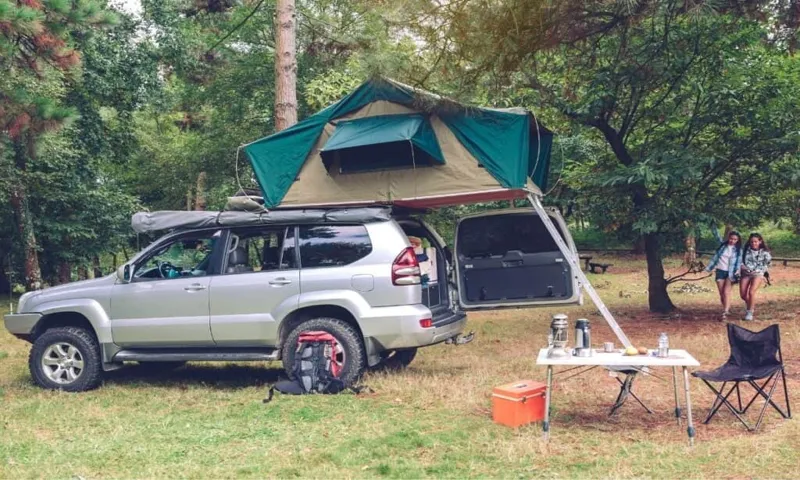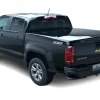Are you considering getting a roof top tent for your outdoor adventures, but you’re not sure about the weight? Well, you’re in the right place! In this blog, we’ll answer the burning question: how much do roof top tents weigh? Roof top tents have become increasingly popular among camping enthusiasts due to their convenience and ease of use. With a roof top tent, you can set up camp anywhere your vehicle can go, making it perfect for off-road adventures or remote camping locations. But before you make that purchase, it’s essential to know how much weight you’ll be adding to your vehicle.
The weight of roof top tents can vary depending on the brand, size, and material used. On average, roof top tents weigh between 100 to 220 pounds. However, it’s crucial to note that this weight does not include the additional weight of any accessories or gear you may have inside the tent.
So if you’re planning to bring along camping chairs, sleeping bags, or other gear, you’ll need to factor in that weight as well. To put it into perspective, imagine carrying a small motorcycle on the roof of your vehicle. That’s roughly the weight you’ll be adding when you install a roof top tent.
It’s a significant amount of weight, so it’s essential to ensure that your vehicle’s roof rack can handle it. Most roof racks have weight limits specified by the manufacturer, so make sure to check those limits and ensure that your roof rack is sturdy enough to support the weight of the tent. It’s also worth considering the impact of the added weight on your vehicle’s performance and fuel efficiency.
The extra weight on the roof can affect your vehicle’s handling and stability, especially during high winds or when driving on uneven terrain. Additionally, the added weight can contribute to increased fuel consumption, so keep that in mind when planning your trips. In conclusion, roof top tents can weigh anywhere from 100 to 220 pounds, depending on the brand and size.
It’s crucial to consider the weight limits of your vehicle’s roof rack and the impact on vehicle performance and fuel efficiency before making your purchase. With the right preparation and understanding, a roof top tent can be a fantastic addition to your outdoor adventures. So go ahead, pack your gear, and hit the open road with your new home away from home!
Table of Contents
Introduction
If you’re considering adding a roof top tent to your outdoor adventures, you might be wondering how much they weigh. Well, the weight of roof top tents can vary depending on the brand and model. On average, a roof top tent can weigh anywhere from 100 to 220 pounds (45 to 100 kilograms).
This weight includes the tent itself, the rooftop mounting system, and sometimes additional accessories like awnings or annexes. It’s important to take into consideration the weight capacity of your vehicle’s roof rack when choosing a roof top tent, as exceeding the weight limit can cause damage to your vehicle. Additionally, keep in mind that the weight of the tent will also impact your vehicle’s fuel efficiency, so it’s something to consider if you’re planning on doing a lot of driving.
Overall, the weight of a roof top tent is something to factor in when making your decision, but it’s also important to prioritize your comfort and convenience while camping.
What are roof top tents?
Roof top tents have become a popular camping accessory in recent years. But what exactly are they? Well, as the name suggests, they are tents that are mounted on the roof of your vehicle. Instead of setting up a traditional tent on the ground, these tents are secured to the roof, allowing you to sleep off the ground and providing a unique camping experience.
Roof top tents come in different sizes and styles, but they all share the same concept of being elevated above the ground. They are typically made with a sturdy and durable material to withstand the outdoor elements, and they often come with a ladder for easy access. Whether you are camping in the wild or just traveling and need a place to sleep, a roof top tent can provide you with a comfortable and convenient sleeping space.

Why are people interested in roof top tents?
Why are people interested in roof top tents? Well, let’s face it, camping has always been a favorite pastime for adventure enthusiasts. And while traditional camping tents have served us well for many years, there’s a growing trend towards roof top tents, and it’s not hard to see why. Roof top tents offer an exciting and convenient way to set up camp wherever you are, whether it’s in the rugged wilderness or a peaceful beachside retreat.
They provide a unique camping experience that allows you to sleep comfortably off the ground, away from creepy crawlies and uneven terrain. Plus, they’re incredibly easy to set up and pack away, saving you precious time that could be better spent exploring your surroundings. So it’s no wonder that more and more people are opting for roof top tents as their go-to camping accommodation.
Weight Range of Roof Top Tents
If you’re considering purchasing a roof top tent, one of the factors you’ll need to consider is the weight. How much do roof top tents actually weigh? Well, the weight range of roof top tents can vary depending on the size and features of the tent. On average, roof top tents can weigh anywhere from 100 to 200 pounds.
This weight includes the tent itself, as well as any accessories or additional features that may be included. It’s important to keep in mind the weight limit of your vehicle’s roof rack system when choosing a roof top tent. You’ll also want to consider the added weight when it comes to fuel economy and driving performance.
So, make sure to do your research and choose a roof top tent that fits within your vehicle’s weight limitations.
Factors that affect the weight of roof top tents
roof top tents, weight range, factors affecting weight, durability, materials, size, capacity, lightweight, aluminum alloy, canvas, fiberglass, aerodynamics, vehicle compatibility, mounting system, ease of setup, accessories, portability, convenience. Roof top tents are gaining popularity among camping enthusiasts due to their convenience and portability. However, understanding the factors that affect the weight of these tents is crucial before making a purchase.
The weight range of roof top tents can vary significantly depending on several factors. One of the key factors is the durability of the materials used. Lightweight materials like aluminum alloy and fiberglass are commonly used to reduce weight while maintaining strength.
Another factor that affects weight is the size and capacity of the tent. Larger tents with higher capacity tend to be heavier. The aerodynamics of the tent also play a role in its weight.
Tents with sleek designs and low profiles are lighter and offer less wind resistance while driving. Vehicle compatibility is another important consideration. Different vehicles have different weight limits for roof top tents, so it is essential to check the manufacturer’s guidelines.
The mounting system of the tent also affects its weight. Tents with simpler and lighter mounting systems are typically lighter overall. Additionally, the ease of setup and included accessories can impact the weight.
Tents with additional features and accessories may be heavier but offer more convenience. Lastly, the material and construction of the tent’s cover and base can affect its weight. Canvas and aluminum alloy are popular choices for their durability and lightweight properties.
Lightweight roof top tents
lightweight roof top tents
Heavyweight roof top tents
“Heavyweight roof top tents” When it comes to choosing a roof top tent, weight is often a big factor to consider. After all, you don’t want to end up with a tent that weighs you down and limits your vehicle’s potential. This is why it’s important to know the weight range of roof top tents before making a decision.
Generally speaking, roof top tents can range in weight from as light as 100 pounds to as heavy as 200 pounds or more. The weight of a tent is influenced by various factors, such as the materials used, the size of the tent, and the additional features it comes with. If you’re looking for a lightweight option that won’t add much to your vehicle’s load, there are plenty of choices available in the market.
These tents are usually made from lightweight materials like aluminum or fiberglass, and they come with a minimalistic design that prioritizes portability and ease of use. They are perfect for those who love to go on weekend camping trips or frequently change camping locations. On the other hand, if you’re planning to stay in one place for an extended period or if you have a larger vehicle that can handle the extra weight, heavyweight roof top tents might be a better option for you.
These tents are usually made from more durable materials like steel or heavy-duty fabric, and they often come with additional features like extra storage compartments or built-in awnings. They are perfect for those who prefer a more spacious and comfortable camping experience. Ultimately, the weight range of roof top tents gives you the flexibility to choose the one that best fits your needs.
Whether you’re a minimalist traveler or a luxury camper, there is a roof top tent out there that will suit your style and requirements. So, take the time to consider the weight of the tent and find the perfect balance between portability and functionality. Happy camping!
Benefits of lightweight and heavyweight roof top tents
When it comes to roof top tents, one of the questions that often comes up is, “How much do they weigh?” The weight of a roof top tent is an important consideration, as it can have an impact on fuel efficiency, vehicle handling, and overall ease of use. Lightweight roof top tents typically weigh between 100-150 pounds, while heavyweight tents can weigh upwards of 200 pounds or more. The benefit of a lightweight tent is that it is easier to install and remove, and it puts less strain on your vehicle.
This is particularly important if you have a smaller vehicle or if you plan on moving your tent frequently. On the other hand, heavyweight tents offer more stability and durability, making them a better option for long-term camping or for those who plan on using their tent in extreme weather conditions. Ultimately, the best choice will depend on your specific needs and preferences.
Advantages of lightweight roof top tents
lightweight roof top tents, heavyweight roof top tents, advantages, benefits In the world of camping and outdoor adventures, roof top tents have become increasingly popular. They offer a convenient and comfortable way to sleep in the great outdoors, without the hassle of setting up a traditional tent on the ground. When it comes to roof top tents, there are two main options to consider: lightweight and heavyweight.
Each type has its own advantages and benefits. Let’s start with lightweight roof top tents. As the name suggests, these tents are designed to be lightweight and easy to carry.
This makes them ideal for those who are constantly on the move and need a tent that can be easily transported from one location to another. Lightweight roof top tents are typically made from materials such as nylon or polyester, which are both durable and lightweight. This means that they won’t add unnecessary weight to your vehicle, making them a great option for those who have smaller cars or are planning on doing a lot of off-roading.
On the other hand, heavyweight roof top tents are designed for those who prioritize durability and sturdiness. These tents are generally made from heavier materials such as canvas or poly-cotton blend. While they may be heavier to carry, heavyweight roof top tents offer additional protection from the elements, making them suitable for camping in extreme weather conditions.
They are also more spacious, allowing for extra headroom and additional storage space. Both lightweight and heavyweight roof top tents have their own advantages. Lightweight tents are easy to carry and perfect for those who prioritize mobility and agility.
They are also great for those who have smaller vehicles or are planning on going off-road. On the other hand, heavyweight tents offer extra durability and protection, making them a better choice for those who are planning on camping in harsh weather conditions. Ultimately, the choice between lightweight and heavyweight roof top tents depends on your specific needs and preferences.
Advantages of heavyweight roof top tents
heavyweight roof top tents, lightweight roof top tents, benefits, advantages, camping, durability, stability, space, comfort, weight When it comes to roof top tents, there are two main options to choose from: heavyweight or lightweight. Both types have their own set of advantages, but today we’re going to focus on the benefits of heavyweight roof top tents. One of the biggest advantages of a heavyweight roof top tent is its durability.
These tents are built to withstand the elements, whether it’s heavy rain, strong winds, or even snow. They are made with high-quality materials that can handle tough outdoor conditions, ensuring that you stay protected and comfortable during your camping trip. Another advantage of heavyweight roof top tents is their stability.
They are designed to be sturdy and secure, even in windy conditions. This means that you don’t have to worry about your tent shaking or swaying while you sleep, giving you peace of mind and a restful night’s sleep. Additionally, heavyweight roof top tents typically offer more space and comfort compared to lightweight ones.
They often have more headroom and larger sleeping areas, providing you with more room to move around and relax. Lastly, despite their weight, these tents are still relatively easy to set up and take down. So if you’re looking for a reliable, durable, and spacious camping experience, a heavyweight roof top tent might be the perfect choice for you.
Choosing the Right Weight for You
When it comes to roof top tents, one important factor to consider is their weight. The weight of a roof top tent can vary depending on several factors, including the size and materials used in its construction. Generally, roof top tents can weigh anywhere between 100 pounds to 220 pounds.
It is important to choose a weight that is suitable for your vehicle’s roof load capacity. You don’t want to exceed your vehicle’s weight limit and risk damaging your roof or compromising your safety. Additionally, a heavier roof top tent may have a negative impact on your vehicle’s fuel efficiency.
So, it’s important to carefully consider the weight of a roof top tent before making a purchase.
Considerations when choosing a roof top tent weight
roof top tent weight
How to determine the weight capacity of your vehicle’s roof
weight capacity of your vehicle’s roof
Personal preferences and camping needs
When it comes to choosing the right weight for your camping gear, it all comes down to personal preferences and camping needs. Some campers prefer lightweight gear because it allows for more flexibility and easy transportation. Others may prefer heavier gear for added durability and stability.
It’s important to consider what type of camping you’ll be doing and how much weight you’re comfortable carrying. For example, if you’re going on a backpacking trip where you’ll be hiking long distances, a lightweight tent and sleeping bag may be a good choice. On the other hand, if you’re planning on setting up camp and staying in one place for an extended period of time, a heavier tent and sleeping bag may be more suitable.
Ultimately, the right weight for you will depend on your specific camping needs and personal preferences.
Conclusion
Roof top tents are like the hidden gems of the camping world. They give you the freedom to sleep under the stars without having to worry about creepy crawlies or uneven ground. But let’s address the elephant on the car roof – how much do these nifty contraptions actually weigh? Well, my friend, they say good things come in small packages, and roof top tents are no exception.
Despite their sturdy construction and impressive comfort, these tents weigh significantly less than your average grizzly bear. In fact, they are like the Chris Hemsworth of camping gear – their weight is lean and mean. On average, roof top tents can clock in anywhere between 100 to 250 pounds.
Now, before you start doubting your car’s hauling capabilities, let me reassure you that this is nothing compared to hauling Uncle Bob after a big Thanksgiving dinner. The weight of roof top tents depends on various factors like size, material, and added features. Think of it as choosing between a small carry-on suitcase and a jumbo-sized one that can fit all your “I might need this” items.
The bigger the tent, the heftier it gets, but we’ll let it slide, because who doesn’t want some extra legroom while camping? Of course, it’s important to consider your vehicle’s weight capacity before mounting a roof top tent. You don’t want your car to resemble a scene from “Fast and Furious,” with the tent flying off like a rocket. Safety first, folks! But hey, if you’re someone who loves to go the extra mile (or in this case, the extra pound), many manufacturers also offer lightweight roof top tents that can give you the best of both worlds – a comfortable night’s sleep and a happy car.
So, there you have it – roof top tents are lighter than a featherweight boxing champion, making them the perfect travel companion for any adventure seeker. Just remember to pack your sense of humor, because when you’re cruising down the road with a roof top tent, you’re sure to get some envious looks and endless jokes about “roof overload.” Now go forth, my friend, and embrace the freedom and comfort of a roof top tent.
Let your wanderlust take flight, and may the weight of your adventures never weigh you down!”
FAQs
How much do roof top tents weigh?
The weight of roof top tents can vary depending on the size, materials used, and additional features. On average, a roof top tent can weigh anywhere between 100 to 200 pounds.
What factors can affect the weight of a roof top tent?
The weight of a roof top tent can be influenced by factors such as the tent’s size, materials used in its construction (such as lightweight aluminum or heavy-duty steel), the type of fabric used for the tent body, and any additional features or accessories added to the tent.
Are there lightweight roof top tents available?
Yes, there are lightweight roof top tents available on the market. Manufacturers are increasingly using lightweight materials, such as aluminum frames and lightweight fabrics, to reduce the overall weight of the tent. These lightweight roof top tents can weigh as little as 80 to 100 pounds.
Are there heavy-duty roof top tents available?
Yes, there are heavy-duty roof top tents available for those who prioritize durability and ruggedness. These tents often have steel frames and heavier fabrics, which can increase the weight. Heavy-duty roof top tents can weigh between 150 and 250 pounds.
Can the weight of a roof top tent affect my vehicle’s performance?
Yes, the weight of a roof top tent can have an impact on your vehicle’s performance, especially in terms of fuel efficiency and handling. It is important to consider your vehicle’s weight capacity and ensure that it can safely support the weight of the roof top tent.
Can I install a roof top tent on any type of vehicle?
While roof top tents can be installed on a variety of vehicles, including SUVs, trucks, and even some cars, it is important to check the weight capacity and roof rack compatibility of your vehicle before installing a roof top tent. Some vehicles may require additional modifications or reinforcements to support the weight of the tent.
Are there any ways to reduce the weight of a roof top tent?
If weight is a concern, there are a few ways to reduce the weight of a roof top tent. Some options include opting for a smaller size tent, choosing lightweight materials, such as aluminum frames and lightweight fabrics, and minimizing additional features or accessories added to the tent. However, it’s important to balance weight reduction with the tent’s functionality and your own comfort requirements.



